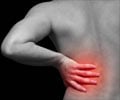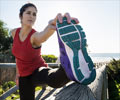Researchers have said that hip exercises can reduce a common type of knee pain in runners.

The study was based on the theory that stronger hips would correct running form errors that contribute to PFP, even though study participants were given no instruction in gait training. The study used a pain scale of 0 to 10, with 3 representing the onset of pain and 7 representing very strong pain-the point at which the runners normally stop running because the pain is too great. The injured runners began the six-week trial registering pain of 7 when they ran on a treadmill and finished the study period registering pain levels of 2 or lower; i.e. no onset of pain.
"I wasn't expecting such huge reductions, to be honest," Dierks said. "We've had a couple of runners who have been at level 2, but the overwhelming majority have been a 2 or below."
PFP, one of the most common running injuries, is caused when the thigh bone rubs against the back of the knee cap. Runners with PFP typically do not feel pain when they begin running, but once the pain begins, it gets increasingly worse. Once they stop running, the pain goes away almost immediately. Dierks said studies indicate PFP essentially wears away cartilage and can have the same effect as osteoarthritis. His study participants showed many of the classic signs of PFP, the most prominent being their knees collapsing inward when running or doing a squat exercise move.
The pilot study thus far involved five runners and a control group that comprised another four runners. Hip strength measurements were taken before and after the runners in the control group maintained their normal running schedule for six weeks. Hip strength measurements were taken for all of the runners before and after the next six-week period in which they all performed the hip-strengthening exercises. The exercises, performed twice a week for around 30 to 45 minutes, involved single-leg squats and exercises with a resistance band, all exercises that can be performed at home.
This study is part of an ongoing study involving hip exercises and PFP pain, with 11 runners successfully using the intervention.
 MEDINDIA
MEDINDIA




 Email
Email









